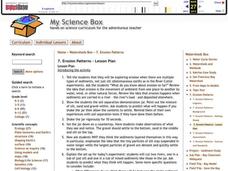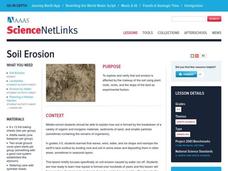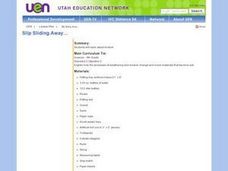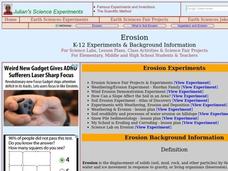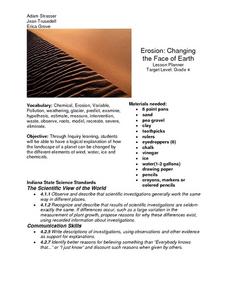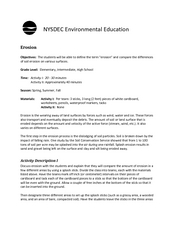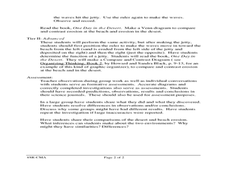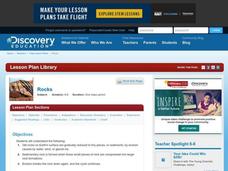Science 4 Inquiry
Let's Get Moving
Rivers top the list of causes of erosion over time. Scholars experiment with wind, water, and ice reshaping sand. They connect the simulations facts about erosion and deposition to understand unique landforms such as the Grand Canyon and...
Curated OER
Erosion Patterns
Middle schoolers explore erosion when there are multiple types of sediments. They view a soil separation demonstration jar before and after agitation to determine how and why the layers settled. In addition, they conduct experiments with...
Curated OER
Erosion and Deposition
Fifth graders study the processes of erosion, transportation, and deposition in soil. They walk outside the school to see examples and then accurately create a physical model which shows each type of soil movement and allows them to...
Curated OER
Soil Erosion
Students examine how erosion is affected by the composition of the soil and the slope of the land. They look at plant roots, rocks and land slope as experimental factors. They complete the associated worksheets before discussing their...
Curated OER
Erosion by the Wind
Fifth graders simulate wind driven soil erosion by using paper confetti to demonstrate the movement of the soil. They write about three examples of soil erosion found in their community.
Curated OER
Erosion: Slip Sliding Away
Fourth graders investigate the causes of erosion. Through several demonstrations including one using sugar cubes and warm water, they observe the effects of erosion. In groups, 4th graders conduct similar experiments and record their...
Curated OER
Sculptors of the Earth
Learners observe evidence of erosion and various rock formations that have formed as a result of erosion and weathering. Their task is to explain how the forces of weathering and erosion contributed to sculpturing these rocks into arches...
Curated OER
Erosion
Students examine soil erosion and what causes it. In this soil instructional activity students complete several experiments on soil erosion and the weathering process.
Curated OER
Erosion: Changing the Face of Earth
Fourth graders explore how the landscape of the planet can be changed by different elements of wind, water, ice and chemicals through hands-on activities. They examine pictures of areas around town and discuss anything they think is out...
Curated OER
Erosion Patterns
Fifth graders explore erosion and the different types of sediment. In this erosion patterns lesson plan students complete an activity and divide into groups and conduct an experiment.
Curated OER
Soil and Agriculture:Lesson 3 - Soil Erosion
Students reseach the different types of soil erosion and ways to control it in this series of activities.
Curated OER
Erosion: On the Move...Defending the Coast Against Wave Attack
Students study how people have tried to save beaches from wave erosion. They examine what has occurred to Cape Hatteras as a result of beach erosion and the efforts to reduce the erosion.
Curated OER
Erosion
Students study various types of erosion. The purpose of these activities is to increase students awareness to the point where they can make intelligent decisions on proper land use.
Curated OER
Blowing and Flowing
Fifth graders compare and evaluate the rate of erosion from water and wind on three type of landscape: bare land, land with sparse vegetation, and land covered by dense vegetation.
Curated OER
A Model of the Rock Cycle
In this rock cycle worksheet, students use different colored crayons to represent different types of rocks. They follow step by step procedures to model the rock cycle with the crayons. Students draw the rock cycle, show weathering,...
Curated OER
The Physical Environment
Fourth graders use damp sand, a baking pan, and water to simulate erosion. In this erosion lesson plan, 4th graders participate in a simulation to show what moving water does to land.
Curated OER
Earth Science
Students explore how water and waves erode the earth. In this erosion instructional activity students determine the processes of wave erosion and building.
Curated OER
Sedimentary Rocks
In this sedimentary rock worksheet, students answer 9 fill-in-the-blank questions and 8 matching questions regarding sedimentary rocks and their formation.
Curated OER
Rocks
Students examine how sedimentary rocks are formed. For this rock lesson students research different rock formations and different types of rock.
Curated OER
Where's the Beach?
Students use beach profile data to analyze how erosion and sediment transport changed seashore slopes. In this geology activity, students plot the data provided and analyze erosion patterns. They also assess coastal erosion management...
Curated OER
Weathering Landforms
Fifth graders brainstorm a list of ways the Earth's surface can change. As a class, they are introduced to the concepts of erosion and weathering and discover how wind and water cause changes to the surface of the Earth. To end the...
Curated OER
THE TRICKLE DOWN EFFECT
Students participate in an exercise which demonstrates how sediments are deposited.
Forest Foundation
The Sustainable Forest
As part of their examination of forest ecosystems, class members examine how foresters, biologists, botanists, geologists, and hydrologists work to together to develop a management plan for sustainable forests.
Curated OER
Sedimentary Rocks- Formation and Types
In this sedimentary rocks resource worksheet, students follow the guide for reading this informational text. They read about the formation of sedimentary rocks, and the three major types of sedimentary rocks.



